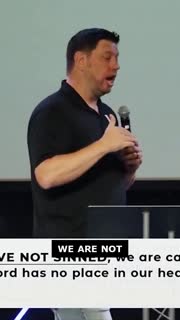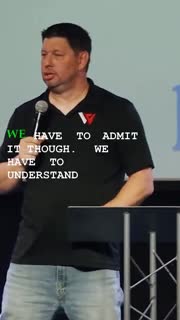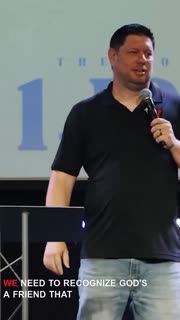Elevating Our Spiritual Lives Through Fellowship and Discipline
Devotional
Sermon Summary
Bible Study Guide
Sermon Clips
1. "Holiness is not, you know, some people think holiness is shaving your head, climbing up on a mountain, putting on a robe and sitting home. You know, that's not what holiness is. And we learned that during that series, that holiness is living separate from the world that we are called to live a separate life lifestyle than the world. And so it doesn't mean perfection. It doesn't mean that we're sinless, but here's catch this play on words. You're going to love it. It doesn't mean we're, we're sinless. It means as we grow in Christ, we want to sin less." [06:02] (33 seconds)
2. "Usually it's Christians that give Christianity a bad name. I'm going to say that again. Usually it's us as believers, Christians who give Christianity a bad name. That's a hard truth to understand because people who don't read the Bible, read the people who read the Bible. They read us. They read our reactions. They read how we respond to stuff. Let me say this. They read what we post. They read what we post online. Pastor always says, don't let your Facebook become your disgrace book." [10:15] (38 seconds)
3. "How do we have fellowship? How do we grow in our relationship with the Lord? How do we make good decisions? How do we not let our sin nature be who we are identified with, but we're identified in our son nature. How do we do that? How do we grow in that unity with him? Part B good and feel good now everybody understand? No, of course you don't. Cause you don't know what part B means. All right, you ready for you? Note takers. Here's what it means. P A R T B pray and read the Bible, pray and read the Bible. Super simple." [12:50] (31 seconds)
4. "We are not sinners because we sin. We sin because we're sinners. I don't remember if I said that earlier, so I'll say it again. We're not sinners because we sin. We sin because we're sinners. We're naturally sinners. We are just born separated from the Lord. That's what verse eight is talking about. Verse 10 is talking about our sin actions. Lying, pride, self-righteousness, deceit, insecurities, guilt, regret, all of these things that are from the enemy. Those are things that we do because of our sin nature." [28:10] (37 seconds)
5. "We are not saved, we are sinners. We are identified by our sin. And what he says is, if, if, somebody say if. If. If we confess that we're a sinner in need of a savior, then he will, he is faithful and just and will cleanse us of all unrighteousness. That means all of our sin. As far as the east is from the west, our past, present and future, he's creating in us a new creation. We are no longer identified by our sin. We are identified by the son, Jesus Christ. Who's thankful for that?" [34:11] (32 seconds)
6. "We have to admit it though. We have to understand that God did for us what we couldn't do for ourselves so that we could have what we don't deserve. We don't deserve an eternity with him. An eternity spent with the father. Second Corinthians promises us this, that our very last breath on earth in Christ, our very last breath on earth, we can be sure that our very next breath will be in the presence of the Lord. We have an eternity with him waiting for us, but that's not all. He didn't just save us just for eternity. He saved us for the here and now, because he's got a plan for us that we can live out today." [34:50] (34 seconds)
7. "We are representing the creator. The one who spoke, let there be light. And there was light. The one who said, hey, let the oceans team with fish. Let the sky team with birds. Let the ground produce vegetation. The creator, we represent the creator. That's pretty awesome that we have a relationship with the creator God. We represent the King of Kings, the Lord of Lords. We represent the ultimate authority on planet earth. And the Bible says, says this, that Jesus is a friend who sticks closer than a brother." [24:59] (32 seconds)
8. "We need to recognize God's a friend that sticks closer than a brother in that we can go to him with anything, but he's not our hangout homie buddy that we're going to chill with on Friday nights. What up JC? Let's go chill. But so many times we treat God as our buddy and that's not it. We are representing the King of Kings. We are representing creation. We are entering into Jesus. Dude, I love that, is that weird. It's that kind of guy that's not. Okay. I'm forget that you got here onomy. I know it was funny at first, but I'm not, you know, to live separate from the world." [25:30] (59 seconds)
9. "We have a responsibility to respond. Do you believe that Jesus came and died on the cross, took his sins on himself? Chapter two in 1 John will talk about being the propitiation that he took our sins on himself. He died, was buried three days later. He rose again, proving that the sins of who we are has no power over him. That he has overcome the power of death and the grave, the power of sin. We put our faith and trust in him, invite him into our life. We are now identified with him." [35:19] (30 seconds)
10. "We have a sin nature. We have a nature that we're born into that. We just naturally are sinners. And so we want to try to curb that as much as we can with our actions and sin less. But that sin nature gets in the way of it. Sometimes doesn't it? We know what we want to do. As Paul says in Romans chapter seven, man, I know what I want to do and what I should do, but I kind of just keep doing the opposite. Anyway, we always, we all have that." [06:53] (24 seconds)
Ask a question about this sermon
2. "Usually it's Christians that give Christianity a bad name. I'm going to say that again. Usually it's us as believers, Christians who give Christianity a bad name. That's a hard truth to understand because people who don't read the Bible, read the people who read the Bible. They read us. They read our reactions. They read how we respond to stuff. Let me say this. They read what we post. They read what we post online. Pastor always says, don't let your Facebook become your disgrace book." [10:15] (38 seconds)
3. "How do we have fellowship? How do we grow in our relationship with the Lord? How do we make good decisions? How do we not let our sin nature be who we are identified with, but we're identified in our son nature. How do we do that? How do we grow in that unity with him? Part B good and feel good now everybody understand? No, of course you don't. Cause you don't know what part B means. All right, you ready for you? Note takers. Here's what it means. P A R T B pray and read the Bible, pray and read the Bible. Super simple." [12:50] (31 seconds)
4. "We are not sinners because we sin. We sin because we're sinners. I don't remember if I said that earlier, so I'll say it again. We're not sinners because we sin. We sin because we're sinners. We're naturally sinners. We are just born separated from the Lord. That's what verse eight is talking about. Verse 10 is talking about our sin actions. Lying, pride, self-righteousness, deceit, insecurities, guilt, regret, all of these things that are from the enemy. Those are things that we do because of our sin nature." [28:10] (37 seconds)
5. "We are not saved, we are sinners. We are identified by our sin. And what he says is, if, if, somebody say if. If. If we confess that we're a sinner in need of a savior, then he will, he is faithful and just and will cleanse us of all unrighteousness. That means all of our sin. As far as the east is from the west, our past, present and future, he's creating in us a new creation. We are no longer identified by our sin. We are identified by the son, Jesus Christ. Who's thankful for that?" [34:11] (32 seconds)
6. "We have to admit it though. We have to understand that God did for us what we couldn't do for ourselves so that we could have what we don't deserve. We don't deserve an eternity with him. An eternity spent with the father. Second Corinthians promises us this, that our very last breath on earth in Christ, our very last breath on earth, we can be sure that our very next breath will be in the presence of the Lord. We have an eternity with him waiting for us, but that's not all. He didn't just save us just for eternity. He saved us for the here and now, because he's got a plan for us that we can live out today." [34:50] (34 seconds)
7. "We are representing the creator. The one who spoke, let there be light. And there was light. The one who said, hey, let the oceans team with fish. Let the sky team with birds. Let the ground produce vegetation. The creator, we represent the creator. That's pretty awesome that we have a relationship with the creator God. We represent the King of Kings, the Lord of Lords. We represent the ultimate authority on planet earth. And the Bible says, says this, that Jesus is a friend who sticks closer than a brother." [24:59] (32 seconds)
8. "We need to recognize God's a friend that sticks closer than a brother in that we can go to him with anything, but he's not our hangout homie buddy that we're going to chill with on Friday nights. What up JC? Let's go chill. But so many times we treat God as our buddy and that's not it. We are representing the King of Kings. We are representing creation. We are entering into Jesus. Dude, I love that, is that weird. It's that kind of guy that's not. Okay. I'm forget that you got here onomy. I know it was funny at first, but I'm not, you know, to live separate from the world." [25:30] (59 seconds)
9. "We have a responsibility to respond. Do you believe that Jesus came and died on the cross, took his sins on himself? Chapter two in 1 John will talk about being the propitiation that he took our sins on himself. He died, was buried three days later. He rose again, proving that the sins of who we are has no power over him. That he has overcome the power of death and the grave, the power of sin. We put our faith and trust in him, invite him into our life. We are now identified with him." [35:19] (30 seconds)
10. "We have a sin nature. We have a nature that we're born into that. We just naturally are sinners. And so we want to try to curb that as much as we can with our actions and sin less. But that sin nature gets in the way of it. Sometimes doesn't it? We know what we want to do. As Paul says in Romans chapter seven, man, I know what I want to do and what I should do, but I kind of just keep doing the opposite. Anyway, we always, we all have that." [06:53] (24 seconds)










